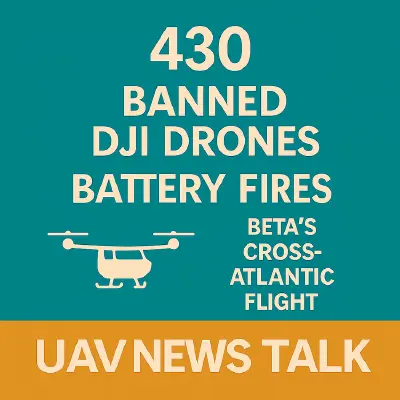In episode 430 of UAV News Talk, Max Trescott and David Vanderhoof return from vacation with urgent news and safety concerns in the drone industry. The episode opens with a major headline: the DJI Mavic 4 Pro is not available in the United States. Although the drone boasts high-end specs—including a 6K camera and improved flight performance—it’s currently unavailable in the U.S. due to concerns about data security and alleged ties between DJI and the Chinese government.
The ban stems from a long-standing effort by U.S. government agencies to restrict the use of DJI drones, especially after reports emerged that some DJI models were transmitting sensitive data back to China. The Pentagon, in particular, flagged DJI as a national security risk. In light of this, many online resellers and websites claiming to sell the Mavic 4 Pro may be scams. Max warns of fake DJI websites offering steep discounts, unauthorized sellers providing units without warranty coverage, and used drones that are “bricked” due to being locked to previous owners' DJI accounts. Buyers are urged to verify the source before purchasing any DJI drone—especially when new models are not officially available.
Next, the discussion shifts to drone battery fires, a serious issue affecting both hobbyist and commercial UAV operators. Max highlights a recent vehicle fire in Mountain View, California, caused by a drone battery left charging on the passenger seat of a truck. Though the fire was extinguished quickly and injuries were minor, it serves as a critical reminder of the dangers associated with charging LiPo (lithium polymer) batteries in enclosed or flammable environments.
In a separate and more devastating incident, a house in Kenosha County, Wisconsin was completely destroyed by a fire linked to drone batteries charging unattended. Tragically, several pets were lost in the blaze. According to reports, the batteries were connected to a newly purchased six-foot drone, and the homeowner had left them charging for hours while away from home. The episode underscores the importance of charging drone batteries only in safe, monitored locations—preferably on a non-flammable surface such as concrete and never inside unattended vehicles or homes.
From fire hazards to electric flight innovation, Max and David then explore the historic cross-Atlantic flight of Beta Technologies’ Alia electric aircraft. The Beta Alia CX300, a fixed-wing eVTOL aircraft, is currently touring Europe and made headlines for flying across the Irish Sea under VFR rules. Its final destination is Bristow Helicopters in Norway, a company known for operating offshore flights to oil platforms.
The Alia’s 250-nautical-mile range—significantly farther than most other electric VTOL aircraft—positions it as a promising alternative to traditional helicopters. Max notes that replacing helicopters for short regional missions is one of the most realistic and cost-effective early use cases for electric vertical takeoff and landing (eVTOL) aircraft. The Beta Alia also features fixed wings to improve lift and efficiency during cruise, giving it a hybrid profile that blends characteristics of both airplanes and helicopters.
In defense-related drone news, the episode also covers the U.S. Department of Defense’s recent unveiling of two
